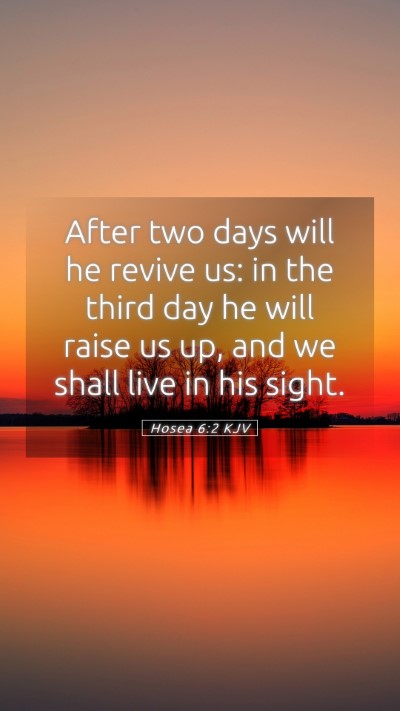Old Testament
Genesis Exodus Leviticus Numbers Deuteronomy Joshua Judges Ruth 1 Samuel 2 Samuel 1 Kings 2 Kings 1 Chronicles 2 Chronicles Ezra Nehemiah Esther Job Psalms Proverbs Ecclesiastes Song of Solomon Isaiah Jeremiah Lamentations Ezekiel Daniel Hosea Joel Amos Obadiah Jonah Micah Nahum Habakkuk Zephaniah Haggai Zechariah MalachiHosea 6:2 Meaning
What is the meaning of Hosea 6:2?
After two days will he revive us: in the third day he will raise us up, and we shall live in his sight.
Hosea 6:2 Bible Verse Meaning
Understanding Hosea 6:2: A Comprehensive Bible Verse Commentary
In Hosea 6:2, we find a profound expression of hope and renewal, articulating a promise of restoration after a period of affliction. This verse reads:
"After two days will He revive us: in the third day He will raise us up, and we shall live in His sight."
Overview of the Verse
This verse encapsulates themes of revival, resurrection, and divine grace. It suggests that after a period of suffering or judgment, God will restore His people. The mention of "two days" and "the third day" is often interpreted as a foreshadowing of Christ's resurrection, highlighting the hope of life that follows sorrow.
Insights from Public Domain Commentaries
Matthew Henry's Commentary
Matthew Henry emphasizes the restorative promise encapsulated in Hosea 6:2. He notes that the reference to "two days" and "the third day" symbolically represents a swift recovery from despair. Henry suggests that this prophecy speaks of both immediate restoration for Israel and a prophetic shadow of Christ’s resurrection, who awakens believers to new life.
Albert Barnes' Commentary
Albert Barnes interprets this verse in the context of Israel's disobedience and subsequent suffering, highlighting God's mercy that follows judgment. He indicates that the "two days" could illustrate a brief period of exile or punishment from which God's people will emerge refreshed and revitalized. Barnes points to the ultimate fulfillment of this promise in the New Testament through the resurrection of Jesus, thereby connecting both testaments' messages of hope.
Adam Clarke's Commentary
Adam Clarke elaborates on the numeric symbolism of "two" and "three," suggesting a pattern of tribulation followed by divine intervention. He argues that the phrase “we shall live in His sight” implies a restored relationship with God, one characterized by righteousness and favor. Clarke also notes the prophetic implications, indicating that this verse provides a beacon of hope in the darkness of Israel’s exile.
Thematic Analysis
This verse provides critical Bible verse insights, particularly in the context of forgiveness and restoration. Key themes include:
- Restoration: God is portrayed as a loving and restorative figure, willing to bring back those who have strayed.
- Hope: The assurance of revival amid despair reflects a profound hope in God's redemptive plan.
- Prophecy: This verse is not only relevant in its immediate context but also serves as a prophetic message concerning the resurrection of Christ, adding layers to its meaning.
Application to Daily Life
For modern-day believers, Hosea 6:2 offers significant applications:
- Hope in Difficult Times: The assurance of God’s promise to revive can encourage individuals facing personal struggles.
- Confidence in God’s Mercy: Understanding that God's judgment is often followed by His mercy can help believers approach God with confidence in times of crisis.
- Encouragement for Repentance: This verse encourages believers to seek a restored relationship with God, emphasizing the importance of repentance and faith.
Cross References
Hosea 6:2 connects with several key Bible passages that enhance understanding.
- Psalm 85:6: "Will You not revive us again, that Your people may rejoice in You?"
- Luke 24:46-47: Jesus speaks of His resurrection in the context of repentance and forgiveness for all nations.
- Romans 6:4: This verse mentions being raised to walk in newness of life, echoing the similar themes of resurrection.
Conclusion
Hosea 6:2 stands as a powerful verse packed with theological and practical implications, serving as hope and assurance of God’s unwavering love and restoration. As one delves into the various Bible verse meanings and interpretations, this verse combines elements of prophecy, mercy, and revival, making it significant in both the Old and New Testaments.
In summary, the understanding of this scripture verse enriches Bible study insights, providing believers with encouragement and a greater understanding of the significance of God's promises, while also bridging connections to the life and resurrection of Jesus Christ.


